Autonomous driving startups in China are in an arms race to put passengers in their machine-driven vehicles. Every few weeks, news arrives that another major player has got the greenlight to launch a new pilot program or a small-scale service.
These press releases, often dotted with regulatory jargon and flowery language to aggrandize the companies’ progress, can be confusing. That’s why we put together this post summarizing the progress of China’s major robotaxi operators — AutoX, Baidu, Deeproute.ai, Didi, Momenta, Pony.ai and WeRide — in 2021 while trying to parse what their announcements actually mean.
Most of the major players have been testing drivered (autonomous vehicles with in-car safety operators) and driverless vehicles for some time in China, so this post will focus on their public-facing services that run on a regular basis. While navigating the costs, safety and regulations around robotaxis, these companies have also dabbled into areas that are quicker to scale, such as self-driving trucks, goods-hauling vans and city buses, though robotaxis remain their focus in the long run.
A few things to note about China’s autonomous driving space
Before we dive in, it’s worth highlighting a few circumstances unique to China’s autonomous vehicle sector.
- Road conditions in the country can vary greatly. An autonomous driving test that takes place in an industrial park in suburban Shenzhen, for instance, will encounter much simpler traffic than one that runs in a meandering urban village downtown.
- Regulations on autonomous vehicles can differ across provinces — and even different districts within the same city. A company that obtains approval to run a fully driverless test in one city isn’t necessarily more technologically advanced than its peers; it could simply mean it’s cozy with a local regulator with a progressive attitude toward self-driving.
- Some regional governments are targeting smart transportation as their growth strategy. Naturally, they are keen to support autonomous vehicle startups. Authorities may give an informal nod to unmanned driving tests in their jurisdictions well before national or city-level regulations are rubberstamped.
- Government support can also manifest in ways like tax breaks, access to favorable land use and cheap office space. That’s in part why China’s major autonomous vehicle startups are concentrated in well-resourced cities like Shenzhen, Guangzhou, Shanghai and Suzhou.
- Local governments in China often set up pilot zones to spur the development of emerging technologies, like self-driving. Such initiatives allow companies to experiment without the usual regulatory constraints that rein in the more mature industries.
- As of today, no city in China has issued a permit for driverless robotaxis, which would allow an autonomous car to transport the public without a safety operator as Waymo and Cruise can in San Francisco. A few cities have granted permits for fully driverless tests on public roads.
AutoX
Headquartered in Shenzhen with an R&D center in California, AutoX was founded in 2016 by former Princeton professor Jianxiong Xiao. Its investors include Alibaba, MediaTek and Chinese state-owned carmaker SAIC Auto.
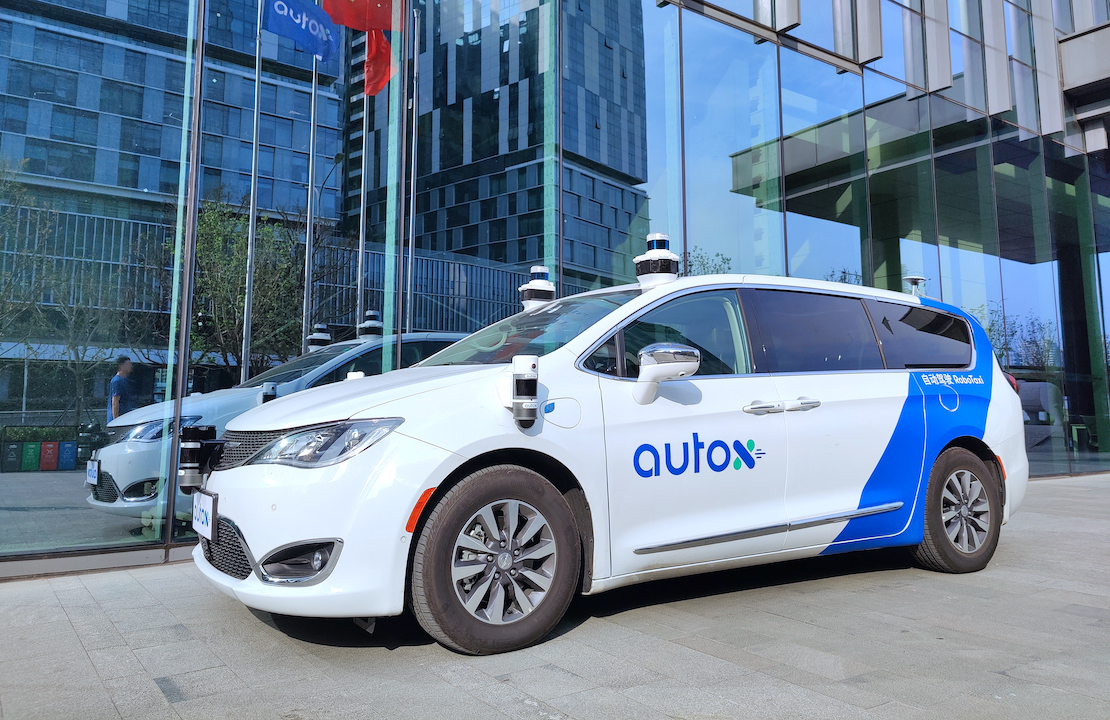
Operations
In August 2020, AutoX began offering drivered robotaxi rides to the public in Shanghai’s Jiading. Users can book trips through Alibaba’s Amap navigation map, which AutoX said was the “first time” a robotaxi service had become available on a major Chinese ride-hailing platform.
Jiading, a suburban district of Shanghai, has attracted a clutch of major automakers and OEMs like SAIC Auto, Volkswagon, NIO, Toyota, Baidu, Didi and Delphi to set up offices. AutoX said in 2020 that it had struck a deal with the Shanghai government to put 100 “self-driving vehicles” on the city’s public roads.
In January 2021, AutoX rolled out a driverless robotaxis service in Shenzhen’s Pingshan, an industrial district that is refashioning itself as a “smart city.” In November, AutoX said the program had covered the entire 168 square kilometers of Pingshan, which is nearly three times Manhattan’s size.
Just a month before, AutoX put a fleet of 25 unmanned autonomous vehicles on the public roads of Shenzhen in a “test”. A Chinese auto news blog reported that the startup went ahead without a license from the local transportation regulator, though AutoX told TechCrunch that it had obtained “government support.” We were unable to reach the relevant department at the time.
Altogether, AutoX said it has “several hundred” robotaxis on the road.
U.S. tests
As of November 2021, AutoX held the testing permits for both drivered and driverless testing in California.
OEM partners
AutoX has been working with Honda and Fiat Chrysler to develop robotaxis in China.
Baidu Apollo Go
Apollo Go is the autonomous driving front of search engine titan Baidu, the Beijing-based internet firm founded in 2000. Baidu kickstarted its autonomous driving unit in late 2015, around the same time most of its startup competitors were born.

Operations
In November 2021, Apollo Go was authorized to provide paid robotaxi service in China’s “first-ever demo zone for commercial autonomous driving” in Beijing.
The fleet of 67 vehicles, monitored by in-car safety drivers, was Apollo Go’s “first commercial deployment” on open roads. The service was available for hailing via Apollo Go’s app and ran every day from 7 am to 10 pm.
Apollo Go got to partake in China’s “first commercial robotaxi demo zone,” though it wasn’t the first to offer rides for compensations (spoiler: see WeRide’s section below). But the event carried much symbolic weight. The pilot area, spanning 60 square kilometers, sits inside the Beijing Economic and Technological Development Zone, a state-level economic project in suburban Yizhuang. It introduced a regulatory framework to stipulate how robotaxi operators could utilize passenger data and price their services. Developments in the capital city could become a model for the rest of China.
Yizhuang isn’t only promoting robotaxis; other types of autonomous vehicles are also welcome in its broader “connected vehicles demo zone.” A number of tech giants, including JD.com and Meituan, started testing unmanned delivery minivans there last year.
The free version of Apollo Go is available to the public in certain areas of Guangzhou, Changsha and Cangzhou, and is currently recruiting early testers in Shanghai.
U.S. tests
As of November 2021, Apollo held the testing permits for both drivered and driverless testing in California.
OEM partners
Apollo Go’s robotaxi fleets are supplied by state-owned FAW Group’s Hongqi, EV startup WM Motor, state-owned GAC’s EV line Aion, and state-owned BAIC’s young EV line Arcfox.
Deeproute.ai
Shenzhen-based Deeproute has made considerable progress for a company that’s merely two years old. In 2019, Zhou Guang founded Deeproute after he left his last autonomous driving venture Roadstar.ai amid company infighting. The young entrepreneur quickly garnered support for his new endeavor. Last September, Deeproute raised a whopping $300 million in a Series B round from investors including Alibaba and Chinese automaker Geely.
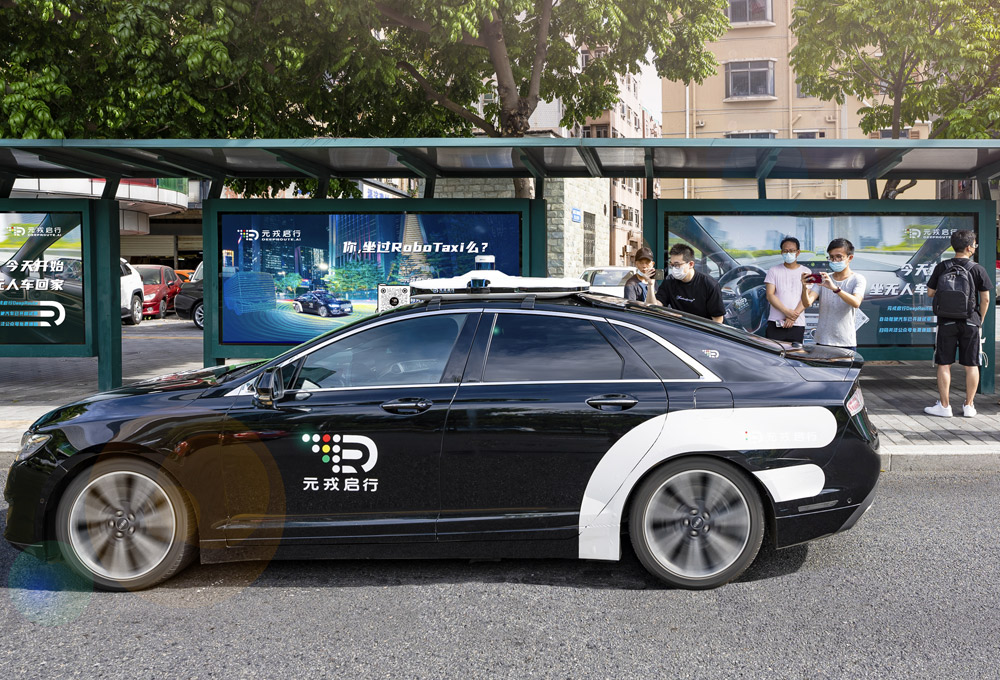
Operations
In July, Deeproute deployed 20 drivered robotaxis on the public roads in Shenzhen’s downtown Futian district, which is close to its headquarters in the tech collaboration zone established by the governments of Hong Kong and Shenzhen.
The robotaxi service, which launched after the company obtained a permit from Shenzhen’s transport regulator in April, is still free to the public with plans to charge passengers in the future, the company told TechCrunch.
Last March, Deeproute’s robotaxi fleets, co-developed with state-owned Dongfeng Motor, began offering free rides to the public in Wuhan. The city in central China is another contender racing to become a pioneer in China’s autonomous driving field.
U.S. tests
As of November 2021, Deeproute held the testing permit for drivered autonomous vehicle testing in California.
OEM partners
The startup and Dongfeng have plans to deploy no fewer than 200 robotaxis by 2022.
Didi
The ride-hailing giant has been quieter than expected about its robotaxi ambitions, given it carved out an autonomous driving subsidiary in 2019 and quickly raised a $500 million round for the new entity — the single largest funding round in the industry at the time.
It wouldn’t be a surprise if Didi has been distracted by other concerns. Shortly following its U.S. public listing last year, the firm was hit with a data probe by Chinese regulators. In December, the Chinese ride hailing giant announced it would delist from the New York Stock Exchange.
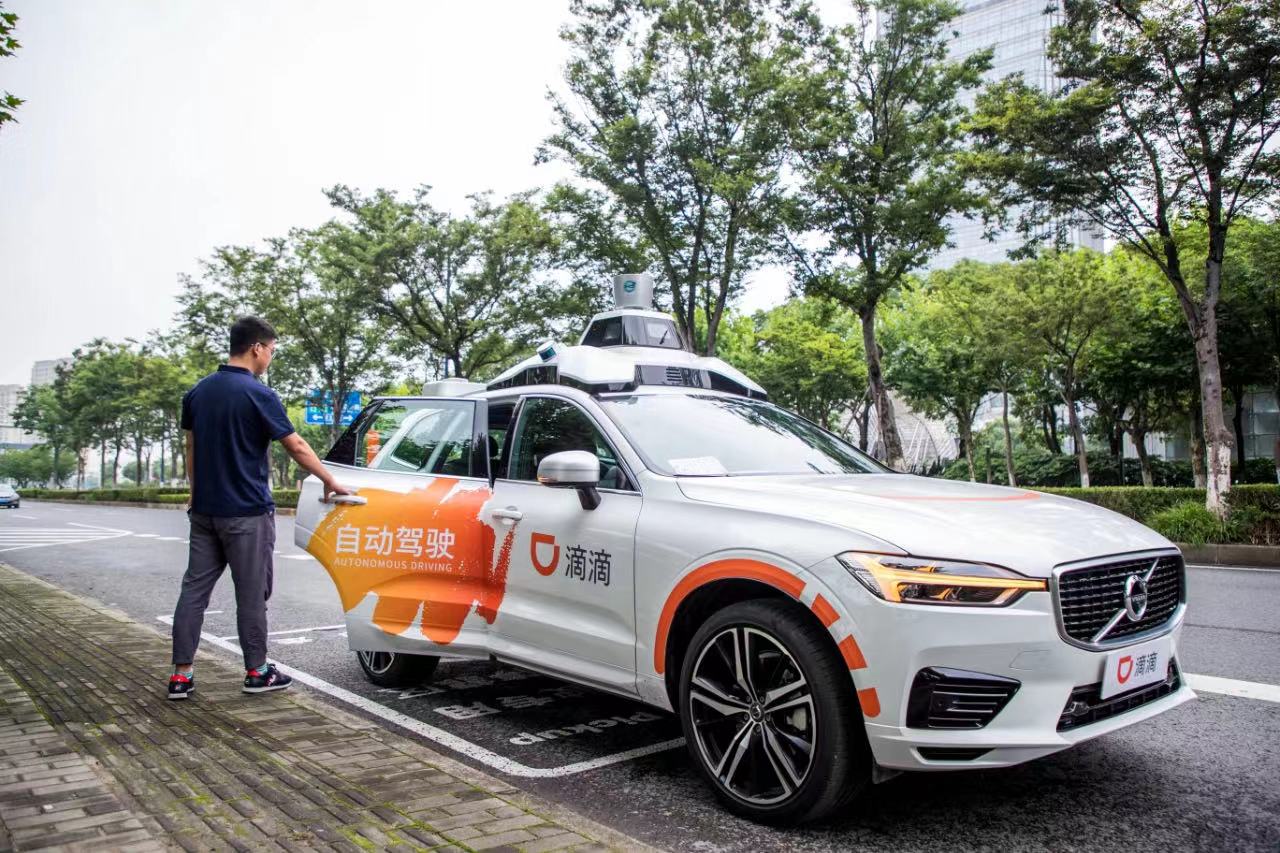
Operations
Didi’s robotaxi service began picking up passengers in some areas of Shanghai in June 2020. The company said it would expand its robotaxi service to Beijing and Shenzhen by the end of 2020 before replicating the scheme outside China in 2021. It has yet to update its progress. The company also set an ambitious goal to operate more than one million “self-driving cars” through its ride hailing platform by 2030.
U.S. tests
As of November 2021, Didi held the testing permit for drivered autonomous vehicle testing in California.
OEM partners
In April 2021, Didi announced that Geely-owned Volvo would be supplying its global robotaxi fleets.
Momenta
Unlike most other robotaxi operators, which focus only on Level 4 fully autonomous driving tech, five-year-old Momenta is also touting advanced driver assistance systems (ADAS) to automakers. This approach helps rake in short-term income and accumulate data for algorithm training at affordable costs, but it’s questioned by industry observers as to whether the startup is devoting enough resources to real driverless tech.
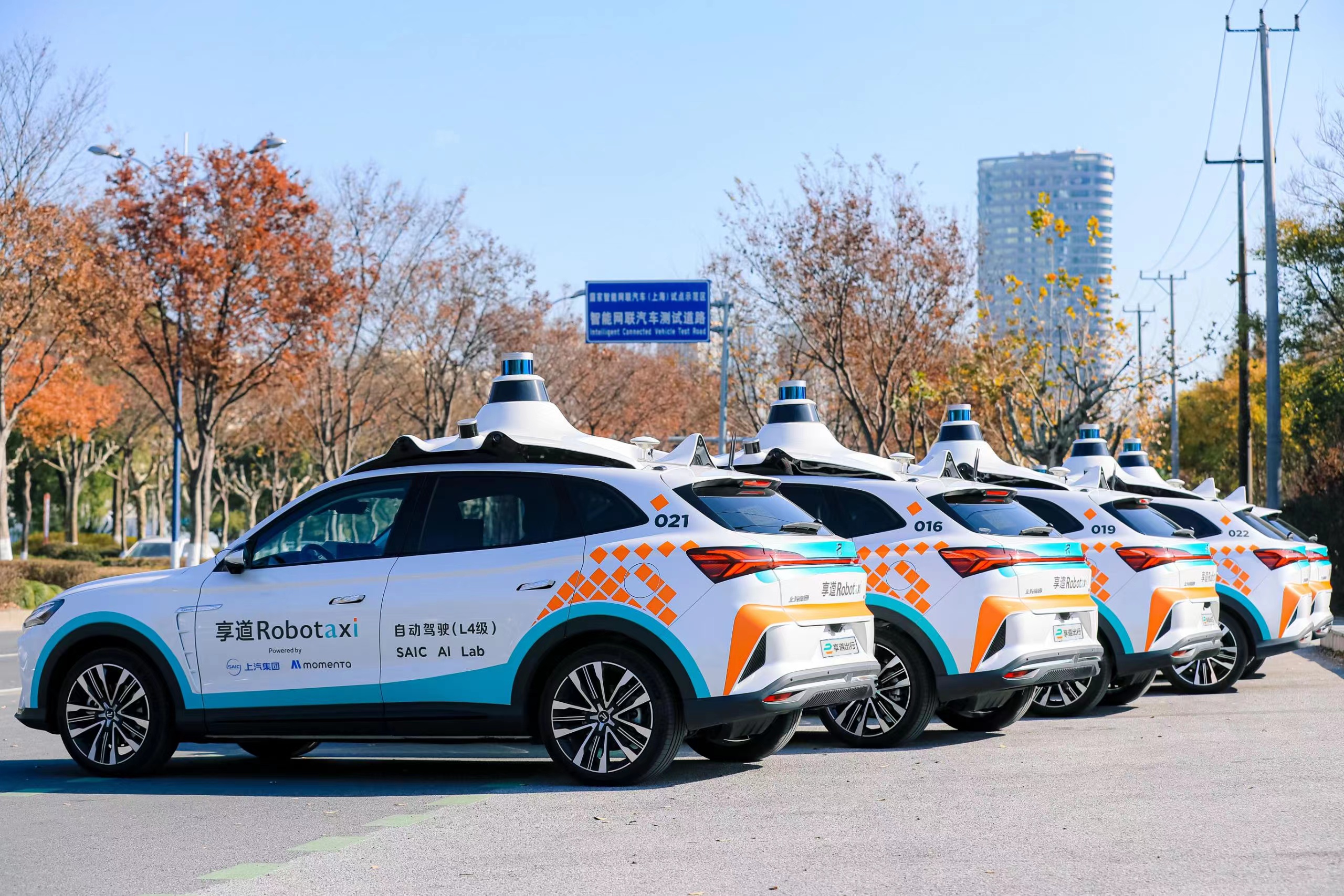
Nonetheless, Suzhou-based Momenta has become one of the most funded autonomous vehicle startups in China. It has raised $1.2 billion from a group of high-profile investors, from General Motors, Daimler, Bosch, Toyota, Chinese state-owned automaker SAIC to Nio Capital, a fund overseen by Nio’s founder William Li.
Unlike most of its peers that have set up R&D forces or are testing in the U.S., Momenta picked Germany as its launch pad for international expansion. In 2021, it opened an office in Stuttgart, the backyard of its investor Daimler.
Operations
In December 2021, Momenta and SAIC launched a free robotaxi service in certain parts of Shanghai. Users could summon these drivered vehicles via SAIC’s app from 8 am to 10 pm every day. The program was “testing and validating potential commercial applications with 20 vehicles,” said Momenta. The program had plans to roll out in Suzhou and Shenzhen in the upcoming months.
The company has won substantial support from the government of Suzhou, an affluent city adjacent to Shanghai. It has a joint venture with the Suzhou branch of the State-owned Assets Supervision and Administration Commission of the State Council (SASAC) to “scale up” robotaxi deployment in the city. SASAC is a powerful government body in China that has oversight of 100 or so large state-owned enterprises.
OEM partners
Momenta has been working with SAIC on its robotaxi fleets. The partners aimed to deploy 200 vehicles across China by 2022.
Pony.ai
Pony was founded in 2016 by two veterans of Baidu’s autonomous vehicle arm, a team that had spawned some of China’s most reputable AV experts. The company, with offices in Guangzhou and California, has raised over $1 billion to date with backings from Toyota.
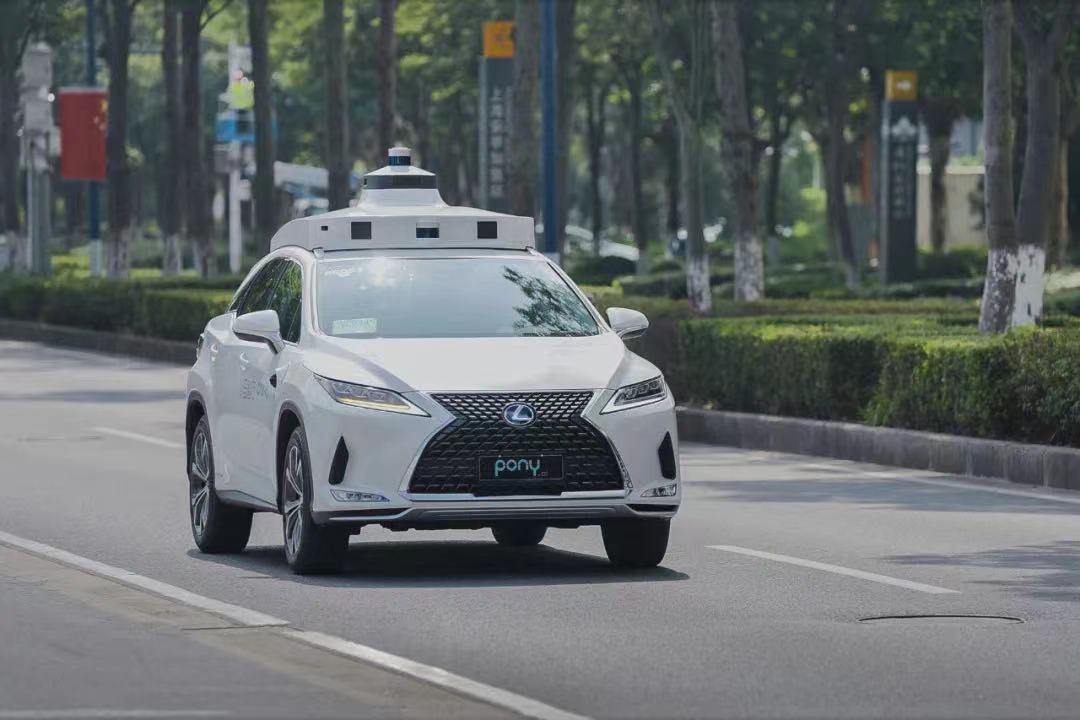
Operations
Aside from Baidu, Pony also obtained approval to operate paid robotaxi services in Beijing’s smart vehicle demo zone last November. The service, called PonyPilot+, had been ferrying passengers for free in the same area.
Last July, PonyPilot+ debuted in Jiading, Shanghai’s automotive hub. In June, Pony added fully driverless cars to its existing robotaxi fleet in Guangzhou.
U.S. tests
In November, the California Department of Motor Vehicles notified Pony that it was suspending its driverless testing permit following a reported collision in Fremont. The decision came six months after Pony obtained the regulatory greenlight. The company’s drivered testing permit in California wasn’t affected.
OEM partners
Multiple manufacturers have supplied Pony’s robotaxis, including Toyota’s Lexus, Hyundai, as well as China’s BYD and Aion.
WeRide.ai
WeRide and Pony share many roots. Both have bases in Guangzhou and California, with founders who hailed from Baidu’s autonomous driving team. Founded in 2017, WeRide raised more than $600 million just within 2021. Its investors include state-owned GAC and Renault-Nissan-Mitsubishi.
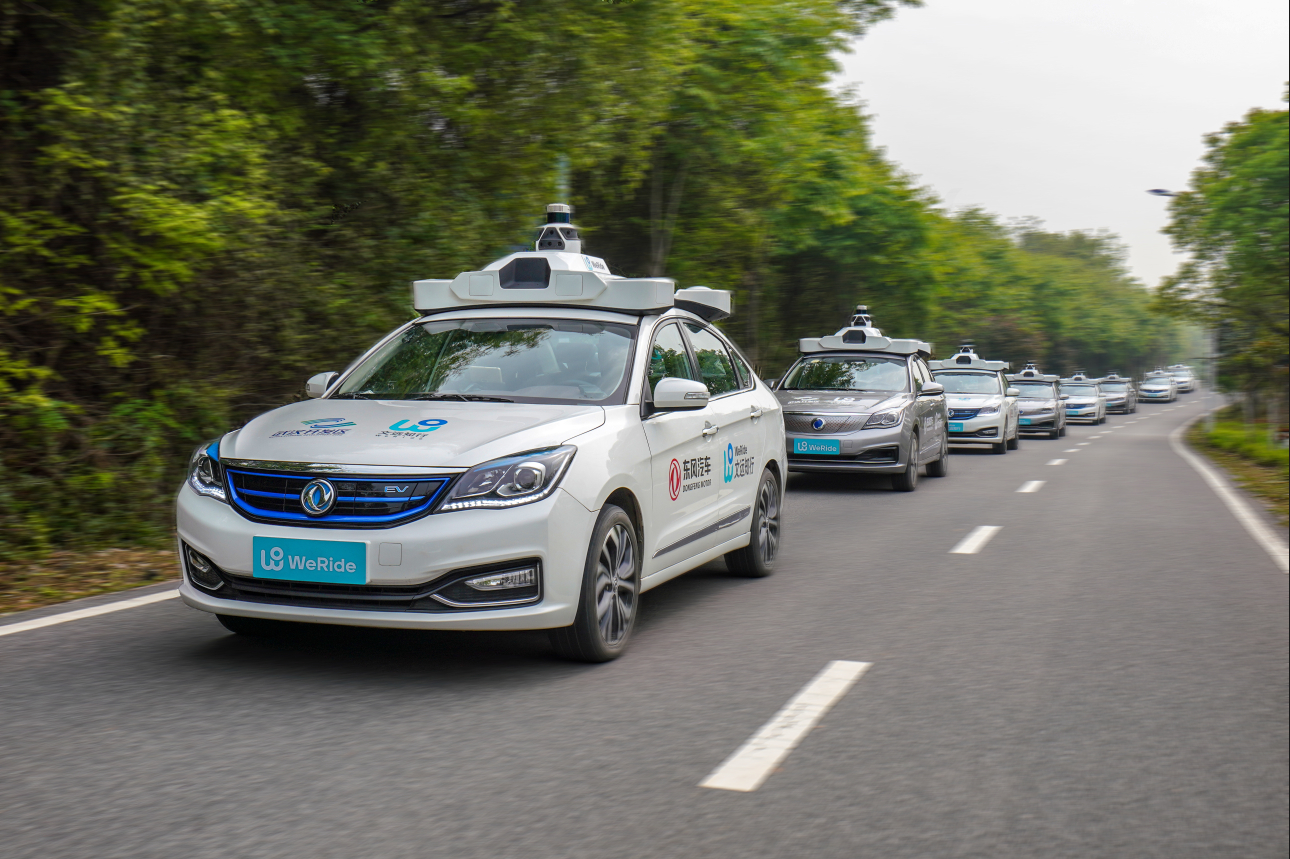
Operations
In November 2019, WeRide’s drivered robotaxis began ferrying the public in a 144 square-kilometer area of Guangzhou. The service was a collaboration with the government-owned Baiyun Taxi Group, the largest taxi company in South China.
WeRide was able to charge passengers at Guangzhou’s taxi rate from the outset, which predated the paid services of Baidu and Pony in Beijing.
This is a familiar scenario where competitors clamor to label their programs the “first” in China. The claims are valid in their own right but deserve closer discernment. As an industry insider said, “Beijing is more influential as a policy bellwether;” but to businesses, the difference between running a paid robotaxi service in Beijing and Guangzhou “isn’t that big.”
“Whether it’s Beijing or Guangzhou, as long as the city has friendly policies, that’s good news. After all, robotaxi companies just want to test their operations,” the person said.
WeRide also operates a drivered robotaxi service in Wuhan.
U.S. tests
As of November 2021, WeRide held the testing permits for both drivered and driverless testing in California.
OEM partners
WeRide and its strategic investor GAC said in December that they planned to build a fleet of “tens of thousands of” robotaxis in the coming years.
Update: Momenta’s funding amount is corrected. Added context to its strategy.































Comment